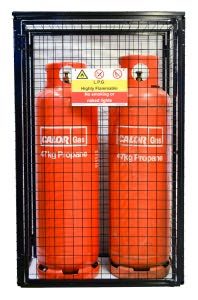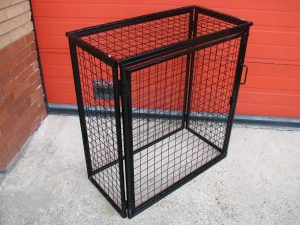 Food vendors at festivals and events are extremely popular with hungry customers. But what can be done to increase safety behind the scenes?
Food vendors at festivals and events are extremely popular with hungry customers. But what can be done to increase safety behind the scenes?
There is a serious risk associated with gas bottles that supply cooking appliances, with serious consequences for improper handling. Safe handling is easy to achieve in just a few steps.
The temporary and mobile nature of food stalls at festivals results in a potential risk of haphazard storage, which can be illegal, leaving stall owners vulnerable to gas bottle damage or theft, and in extreme cases injury to the public.
Legislation
There is a wide amount of guidance and advice from the government and from NCASS on gas safety. If you are in doubt, you should always contact your local Gas Safety Inspector for advice.
What are the risks?
The most common risks are bottles falling over and rupturing, opportunity theft from easily accessible bottles, and leaking gas mixing with other gases to cause volatile explosions.
Recent news stories have highlighted the dangers of poorly stored gas bottles. In 2013, a burger van in Eastbourne exploded into a fireball due to a leak of gas from a stored canister. In 2011 three individuals were seriously burned at Manchester Food and Drink festival when a gas bottle exploded.
All of these awful accidents could have been avoided by following some simple best gas bottle safety practise.
How to store your Gas bottles
There are some key points to follow for safely securing gas bottles, wherever they are stored. This applies to all events as well as the storage of gas on construction sites, warehouses, retail units and schools.
How NOT to store your bottles:
- Do not store bottles together of different types
- Do not store bottles where they can be easily knocked over
- Do not stack small bottles on top of each other
- Do not store in easily accessible areas without security
Best practise includes:
- Store Gas Cylinders:
- Outdoors at ground level
- Vertically
- Different gas types separately
- Empty cylinders separately
- The area must be well ventilated and well drained
- Securely stored in a lockable cage
- Display Health and Safety signs at all times
Are you breaking the Law?
Due to the risks involved, insurance companies may refuse to cover mobile caterers that are not following this best practise. Legal compliance is therefore important to follow at all times, with serious consequences, and even prison, if the correct processes and certificates are not obtained.
Always ensure that certificates are obtained from a gas safety engineer that is on the gas safety register.
Golden Rules of Event and Catering Gas Storage
- Protect gas bottles from interference in a lockable, ventilated mesh cage
- Gas bottles over 13KG MUST be secured upright to prevent falling
- Display Health & Safety signage on the storage cage
- If more than 1 catering appliance is connected to a gas bottle, your stall must be inspected by a gas safety engineer
- Gas bottles must be stored in a ventilated area, on a flat, even and non-combustible surface
- The Nationwide Caterers Association (NCASS) state that you must: “Have only the required number of cylinders to operate the equipment plus a reserve of the same amount as a maximum”
Folding Gas Cages for Festivals and Events
With the event market in mind, we have designed a range of lightweight, folding gas cages that can easily be folded up for transportation and quick set up.
Further Information
For further information, you should always contact your local council or Gas Inspection Officer for official advice. Please see www.ncass.org.uk for more details.
Sources
- https://www.ncass.org.uk/mobile-catering-home/content/get-legal/law-pages/gas-safety
- https://www.ncass.org.uk/docs/default-source/codes-of-practice/lpg-installation-in-marquees_v5.pdf?sfvrsn=0
- http://www.streetfood.org.uk/gas-safe.html
- http://www.streetfoodnews.co.uk/mobile-catering-gas-safety-checks/

